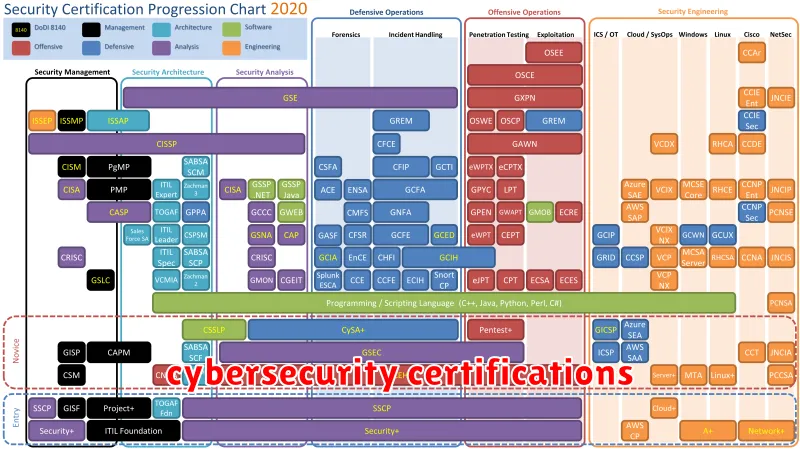In today’s digital age, cybersecurity is more critical than ever. As businesses and individuals become increasingly reliant on technology, the threat of cyberattacks grows exponentially. This has created a booming demand for skilled cybersecurity professionals who can protect against these threats. If you’re looking to boost your career prospects and make a real impact in a high-demand field, pursuing cybersecurity certifications is a smart move.
Earning a respected cybersecurity certification demonstrates your commitment to learning the latest security practices and technologies. It validates your expertise to potential employers and gives you a competitive edge in the job market. With a strong foundation in cybersecurity, you’ll be equipped to tackle the ever-evolving challenges of protecting sensitive data and systems from malicious actors.
Understanding the Importance of Cybersecurity Certifications
In today’s digital world, cybersecurity is paramount. With the constant threat of data breaches and cyberattacks, it’s more important than ever for businesses and individuals to have the knowledge and skills to protect themselves.
This is where cybersecurity certifications come in. They demonstrate your expertise, validate your skills, and open doors to exciting career opportunities.
Here’s why cybersecurity certifications are so important:
- Credibility and Recognition: Holding a certification shows employers that you’ve invested in your education and possess the required skills to excel in the field.
- Professional Edge: In a competitive job market, certifications can help you stand out from the crowd. They’re a powerful tool to showcase your knowledge and commitment to cybersecurity.
- Career Advancement: Many employers look for certified professionals, and certifications can unlock higher-paying roles and leadership opportunities.
- Enhanced Skills and Knowledge: Preparing for a cybersecurity certification often involves rigorous study and practice, which helps you deepen your understanding of the latest threats and best practices.
Top Cybersecurity Certifications in Demand
In today’s digital world, cybersecurity is more important than ever. Organizations of all sizes are facing a growing number of cyber threats, and they need qualified professionals to protect their data and systems. If you’re looking to boost your career in cybersecurity, earning a certification is a great way to demonstrate your skills and knowledge to potential employers.
There are many different cybersecurity certifications available, but some are more in demand than others. Here are a few of the top cybersecurity certifications that are currently in high demand:
CompTIA Security+
CompTIA Security+ is an entry-level certification that is widely recognized by employers. It covers a broad range of cybersecurity topics, including networking, security principles, and threats. The certification is a great starting point for those who are new to cybersecurity or who want to advance their careers in this field.
Certified Information Systems Security Professional (CISSP)
The CISSP is a more advanced certification that is highly respected in the industry. It is designed for experienced cybersecurity professionals and covers a wide range of topics, including security architecture, risk management, and incident response.
Certified Ethical Hacker (CEH)
The CEH certification is designed to train individuals in ethical hacking techniques. It covers topics such as penetration testing, vulnerability analysis, and security assessment. This certification is a great choice for those who want to work in penetration testing or other security-related roles.
Certified Information Systems Auditor (CISA)
The CISA certification is for individuals who want to work as information systems auditors. It covers topics such as auditing information systems, managing information security risk, and developing internal controls. This certification is a good choice for those who are interested in working in compliance or security auditing.
Certified Information Privacy Professional (CIPP)
The CIPP certification focuses on data privacy and protection. It covers topics such as privacy laws, regulations, and best practices. This certification is a good choice for those who are interested in working in data privacy or compliance roles.
Earning one of these certifications can help you stand out from the competition and increase your earning potential. It can also help you qualify for more advanced roles and responsibilities. If you’re looking to boost your career in cybersecurity, consider pursuing one of these highly sought-after certifications.
CompTIA Security+: Your Gateway to Cybersecurity
In the rapidly evolving landscape of cybersecurity, a robust skillset is paramount. Obtaining the right certifications can be your key to unlocking a rewarding career in this dynamic field. Among the many certifications available, the CompTIA Security+ stands out as a fundamental and highly sought-after credential, serving as a gateway to exciting cybersecurity opportunities.
The CompTIA Security+ is globally recognized as a benchmark for entry-level cybersecurity professionals. This certification demonstrates your foundational knowledge in key security concepts, including:
- Network security
- Threat and vulnerability management
- Security operations and incident response
- Cryptography and access control
- Compliance and legal issues
Earning the CompTIA Security+ credential signals to potential employers that you possess the essential skills and knowledge to contribute effectively to a cybersecurity team. It’s often a prerequisite for more advanced certifications and positions, making it a valuable stepping stone in your career journey.
The certification exam itself is vendor-neutral, meaning it focuses on widely applicable cybersecurity principles rather than specific technologies. This makes the CompTIA Security+ relevant across a broad range of industries and organizations, increasing your employability prospects. Additionally, the certification’s emphasis on hands-on skills ensures you’re prepared to tackle real-world security challenges.
The CompTIA Security+ is more than just a certification; it’s an investment in your future. By pursuing this credential, you’ll gain a comprehensive understanding of cybersecurity fundamentals, enhancing your career prospects and opening doors to exciting opportunities in this critical field.
CISSP: For Experienced Security Professionals
The Certified Information Systems Security Professional (CISSP) certification is widely recognized as the gold standard in cybersecurity. It demonstrates a deep understanding of information security principles and practices, making it a highly sought-after credential for experienced security professionals.
If you’re an experienced professional looking to advance your career in cybersecurity, the CISSP can be a valuable asset. It can help you:
- Increase your earning potential: CISSP holders typically command higher salaries than their non-certified counterparts.
- Gain credibility and recognition: The CISSP is globally recognized, making it a valuable credential for job seekers and employers alike.
- Open doors to new career opportunities: The CISSP can qualify you for a wider range of security roles, including security architect, security manager, and chief information security officer.
- Enhance your knowledge and skills: The CISSP exam requires a broad understanding of security domains, forcing you to expand your knowledge and skillset.
While the CISSP exam is challenging, it’s attainable with dedication and preparation. If you have a solid foundation in information security and are willing to put in the effort, you can achieve this valuable certification and significantly boost your career.
CISM: Managing Information Security Risks
In the ever-evolving landscape of cybersecurity, obtaining the right certifications can significantly boost your career prospects. Among the highly regarded certifications, the Certified Information Security Manager (CISM) stands out as a testament to your expertise in managing information security risks.
The CISM certification, offered by ISACA, focuses on the critical aspects of information security governance, risk management, and control. By earning this credential, you demonstrate your ability to:
- Develop and implement a comprehensive information security program.
- Identify, assess, and manage information security risks effectively.
- Implement and oversee security controls across various organizational domains.
- Ensure compliance with relevant security standards and regulations.
The CISM certification not only validates your knowledge but also provides you with a competitive edge in the cybersecurity job market. It opens doors to leadership positions, such as Chief Information Security Officer (CISO), Security Manager, or Information Security Consultant.
The CISM certification’s emphasis on risk management is particularly valuable in today’s digital environment. It equips you with the skills and knowledge to:
- Conduct thorough risk assessments to identify vulnerabilities and potential threats.
- Develop effective risk mitigation strategies aligned with organizational priorities.
- Monitor and evaluate the effectiveness of security controls on a regular basis.
- Communicate security risks and recommendations to stakeholders effectively.
By investing in the CISM certification, you invest in your future and demonstrate your commitment to excellence in the field of information security. Its relevance and value continue to grow as cybersecurity threats become increasingly sophisticated.
CEH: Becoming an Ethical Hacker
In the realm of cybersecurity, the demand for skilled professionals is surging, and obtaining a recognized certification is a crucial step toward a successful career. Among the many certifications available, the Certified Ethical Hacker (CEH) stands out as a highly sought-after credential. Earning the CEH designation can significantly boost your career prospects and open doors to exciting opportunities in the cybersecurity industry.
The CEH certification, offered by EC-Council, is globally recognized and respected. It validates your knowledge and skills in identifying and mitigating security vulnerabilities in networks and systems. The exam covers a comprehensive range of topics, including:
- Footprinting and reconnaissance
- Scanning networks
- Vulnerability analysis
- System hacking
- Malware analysis
- Social engineering
- Cryptography
- Legal and ethical hacking
By obtaining the CEH certification, you demonstrate your expertise in ethical hacking techniques and your ability to identify and address security risks. This valuable credential can enhance your credibility, increase your earning potential, and open up new career avenues.
Whether you’re a seasoned security professional or a newcomer to the field, the CEH certification can be a valuable asset. It provides a structured and comprehensive framework for acquiring the skills and knowledge necessary to excel in cybersecurity.
If you’re ready to take your cybersecurity career to the next level, consider pursuing the CEH certification. It’s a rewarding and impactful journey that can lead to a fulfilling and impactful career in the ever-evolving world of cybersecurity.
CCNP Security: Advanced Network Security
In today’s digital landscape, cybersecurity is paramount. Organizations are increasingly vulnerable to cyber threats, making the demand for skilled cybersecurity professionals skyrocket. One certification that can significantly boost your career in this domain is the CCNP Security certification.
The CCNP Security certification, offered by Cisco, is a globally recognized credential that validates your expertise in advanced network security concepts. It demonstrates your ability to design, implement, and troubleshoot secure network infrastructure. This certification equips you with the skills needed to protect organizations from a wide range of threats, including malware, phishing, and denial-of-service attacks.
Earning the CCNP Security certification opens doors to various career opportunities. You can become a Security Engineer, Network Security Analyst, Security Architect, or even a Cybersecurity Consultant. It’s a valuable asset that strengthens your resume and positions you as a highly sought-after professional in the cybersecurity industry.
AWS Certified Security – Specialty: Cloud Security Expertise
In the ever-evolving landscape of cybersecurity, obtaining the right certifications is crucial for career advancement. Among the many available options, the AWS Certified Security – Specialty stands out as a highly sought-after credential that demonstrates your expertise in cloud security. This certification validates your knowledge and skills in securing AWS environments, making you a valuable asset to any organization.
By achieving the AWS Certified Security – Specialty, you showcase your ability to:
- Design, implement, and manage secure AWS architectures.
- Identify and mitigate security risks specific to cloud environments.
- Apply best practices for data protection, access control, and threat detection.
- Comprehend security compliance frameworks like ISO 27001 and PCI DSS.
- Utilize AWS security services effectively, such as IAM, KMS, and CloudTrail.
The certification is not only a testament to your technical proficiency but also demonstrates your commitment to professional development. It opens doors to exciting career opportunities, including roles like:
- Security Engineer
- Security Architect
- Cloud Security Analyst
- Penetration Tester
- Compliance Manager
Furthermore, the AWS Certified Security – Specialty enhances your credibility and earning potential. Employers recognize the value of certified professionals and are willing to invest in their skills. By investing in this certification, you invest in your future.
If you’re passionate about cloud security and seeking to elevate your career, the AWS Certified Security – Specialty is an excellent choice. It provides a comprehensive framework for understanding and addressing security challenges in the cloud, empowering you to become a leading expert in this critical field.
Azure Security Engineer Associate: Microsoft Azure Security
In today’s digital landscape, cybersecurity is paramount. Organizations rely heavily on cloud computing platforms like Microsoft Azure to store and manage sensitive data. This makes securing Azure environments a critical priority. The Azure Security Engineer Associate certification is a highly sought-after credential that validates your expertise in securing Azure resources.
This certification demonstrates your ability to implement security controls, manage identities and access, and protect data in Azure. By earning this credential, you showcase your knowledge of fundamental security concepts, Azure security services, and best practices. This makes you a valuable asset to any organization that relies on Azure for its cloud infrastructure.
The Azure Security Engineer Associate exam covers a wide range of security topics, including:
- Implementing Azure security policies and standards
- Managing Azure identities and access control
- Securing Azure compute, storage, and networking resources
- Protecting data in Azure using encryption and other security measures
- Monitoring and responding to security threats in Azure
By preparing for and passing this exam, you’ll gain in-depth knowledge of Azure security best practices and develop valuable skills that can help you protect your organization’s data and systems. This certification can significantly enhance your career prospects and open doors to exciting job opportunities in the growing field of cloud security.
Choosing the Right Cybersecurity Certification for You
In today’s digital world, cybersecurity is more important than ever. As a result, the demand for skilled cybersecurity professionals is skyrocketing. Earning a cybersecurity certification can be a great way to boost your career and prove your expertise to potential employers. But with so many different certifications available, how do you choose the right one for you?
The first step is to consider your current skills and experience. What areas of cybersecurity are you most interested in? Do you have any prior experience in IT or security? Once you have a good understanding of your strengths and weaknesses, you can start researching different certifications.
Next, consider your career goals. Do you want to specialize in a particular area of cybersecurity, such as network security or ethical hacking? Or are you looking for a more general certification that can help you advance your career in a variety of roles?
Finally, think about your budget and time commitment. Some certifications are more expensive than others, and some require more time to study and prepare for the exam.
By carefully considering these factors, you can choose a cybersecurity certification that will help you achieve your career goals and advance your skills.
Tips for Preparing for Your Certification Exam
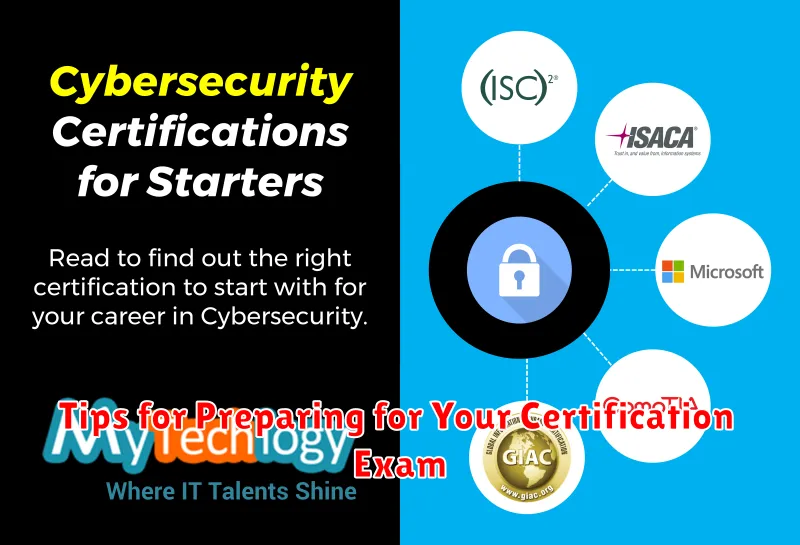
Earning a cybersecurity certification is an excellent way to advance your career and demonstrate your expertise. But before you can reap the rewards, you need to pass the certification exam. This can be daunting, but with the right preparation, you can succeed. Here are some tips to help you prepare for your cybersecurity certification exam.
Understand the Exam Objectives
The first step is to understand what the exam covers. Most certification bodies provide a detailed exam blueprint outlining the topics and areas you need to know. Study the exam objectives carefully. This will give you a clear picture of what to expect on the exam and allow you to focus your preparation efforts accordingly.
Choose the Right Study Materials
There are many different resources available to help you study for your cybersecurity certification exam. Choose materials that align with the exam objectives and your learning style. Some popular options include:
- Official study guides: These guides are written by the certification body and provide the most comprehensive coverage of the exam content.
- Practice exams: These exams can help you assess your understanding of the material and identify areas where you need to focus your study.
- Online courses: These courses can offer interactive learning experiences and provide you with expert instruction.
Develop a Study Plan
Don’t wait until the last minute to start studying. Create a study plan that allows you to cover all the exam objectives in a timely manner. Break down your study materials into manageable chunks and allocate specific time slots for studying. Make sure to schedule in breaks and review sessions.
Practice, Practice, Practice
The best way to prepare for your cybersecurity certification exam is to practice. Take as many practice exams as possible. This will help you get familiar with the exam format, the types of questions you can expect, and the time constraints. Practice also helps solidify your understanding of the material.
Get Adequate Rest
Don’t underestimate the importance of sleep and rest. Make sure to get enough sleep the night before your exam. A well-rested mind is better able to focus and retain information. It’s also essential to avoid cramming the night before the exam as it can be counterproductive.
Stay Calm and Confident
On the day of the exam, it’s important to stay calm and confident. Remember that you have put in the hard work and preparation. Trust your knowledge and approach the exam with a positive mindset. Avoid distractions and focus on completing each question to the best of your ability.
Passing your cybersecurity certification exam is a significant achievement. It will enhance your credentials, open up new career opportunities, and solidify your position in the competitive cybersecurity field. By following these tips, you can increase your chances of success and take your cybersecurity career to the next level.
The Benefits of Earning a Cybersecurity Certification
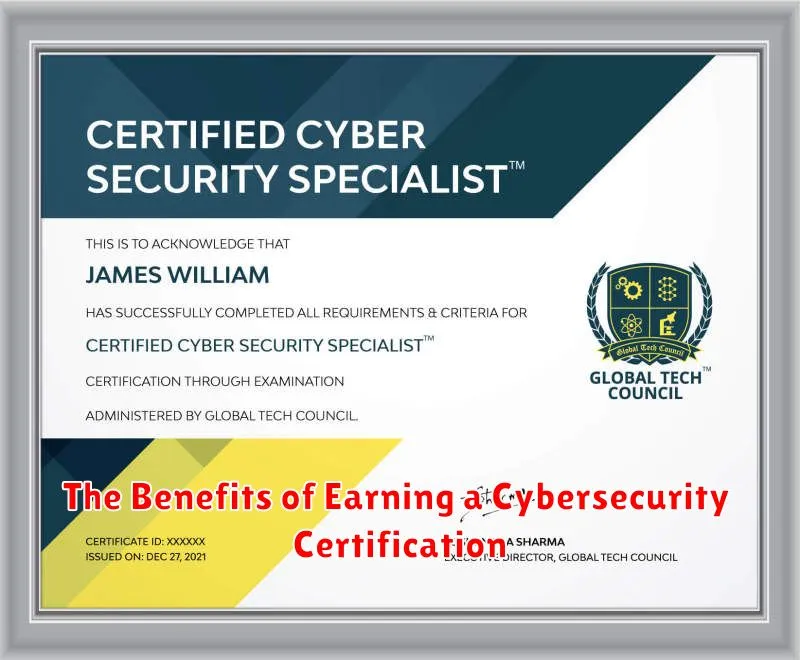
In today’s digital age, cybersecurity is more crucial than ever. With increasing cyber threats, businesses and organizations are actively seeking qualified professionals to protect their valuable data and systems. Earning a cybersecurity certification can significantly boost your career prospects and open doors to exciting opportunities. Here are some compelling benefits of acquiring a cybersecurity certification:
Enhanced Career Prospects: A cybersecurity certification demonstrates your commitment to the field and verifies your expertise. It makes you stand out from the competition and enhances your credibility in the eyes of potential employers. With a certification, you’ll be more competitive in the job market and increase your chances of securing lucrative cybersecurity roles.
Increased Salary Potential: Certified cybersecurity professionals are in high demand, and employers are willing to pay a premium for their skills. Research shows that individuals with cybersecurity certifications earn significantly higher salaries than their non-certified counterparts. You can expect a substantial increase in your earning potential by investing in a certification.
Specialized Knowledge and Skills: Cybersecurity certifications are designed to equip you with specialized knowledge and skills that are highly sought after by employers. They provide in-depth training on specific cybersecurity domains, such as ethical hacking, penetration testing, incident response, and digital forensics. By specializing in a particular area, you can become a valuable asset to any organization.
Career Advancement Opportunities: A cybersecurity certification can serve as a stepping stone to higher-level positions. It demonstrates your commitment to continuous professional development and your ability to adapt to the ever-evolving cybersecurity landscape. With a certification, you can advance your career path and take on leadership roles in cybersecurity teams.
Improved Job Security: In today’s dynamic job market, job security is a major concern. Cybersecurity certifications can provide a significant advantage in this regard. Employers value professionals with certified skills and are more likely to retain them during economic downturns. With a cybersecurity certification, you can increase your job security and ensure long-term career stability.
Professional Recognition: Cybersecurity certifications are recognized globally by industry leaders and employers. Earning a reputable certification signifies that you have met industry standards and possess the necessary knowledge and skills. It elevates your professional standing and provides recognition for your expertise.
Investing in a cybersecurity certification is a wise decision that can significantly enhance your career prospects and open up a world of opportunities. With the right certification, you can position yourself as a valuable asset in the ever-growing field of cybersecurity.
Landing Your Dream Cybersecurity Job with the Right Certification
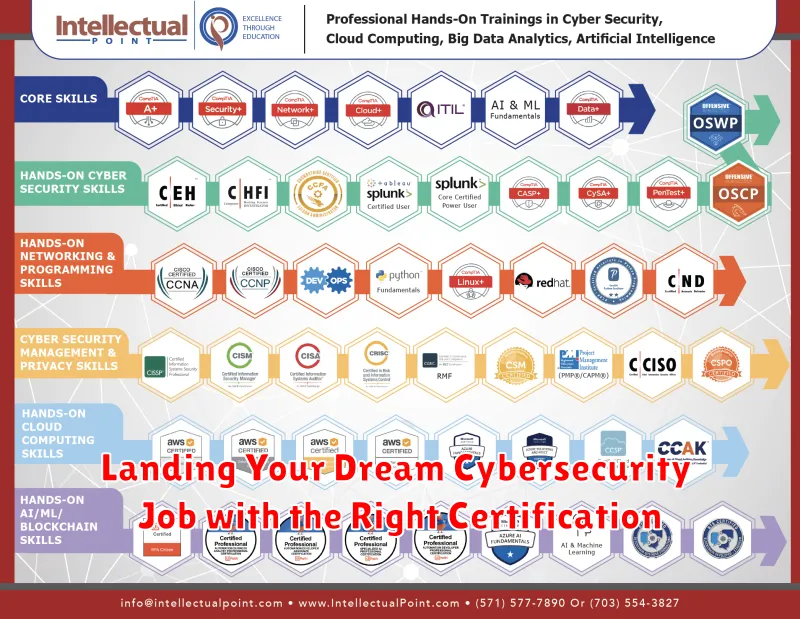
The cybersecurity job market is booming, with a massive demand for skilled professionals. To stand out from the competition and land your dream cybersecurity job, earning the right certifications is crucial. Certifications not only demonstrate your expertise but also validate your knowledge and skills, making you a more attractive candidate to potential employers.
When choosing a certification, consider your career goals and the specific role you aspire to. Some popular cybersecurity certifications include:
- CompTIA Security+: A foundational certification that covers a broad range of cybersecurity topics, ideal for entry-level roles.
- Certified Ethical Hacker (CEH): A highly regarded certification for professionals who want to specialize in ethical hacking and penetration testing.
- Certified Information Systems Security Professional (CISSP): A globally recognized certification that validates your expertise in information security management.
- Certified Information Systems Auditor (CISA): A certification for professionals who want to focus on auditing, control, and governance in information systems.
Beyond choosing the right certification, it’s essential to invest time in studying and preparing. Utilize online resources, practice exams, and engage in cybersecurity communities to enhance your knowledge and improve your chances of success.
The right cybersecurity certification can be a game-changer in your career journey. By demonstrating your expertise and commitment to the field, you can unlock doors to exciting opportunities and land your dream cybersecurity job.
Staying Up-to-Date with Cybersecurity Trends and Certifications
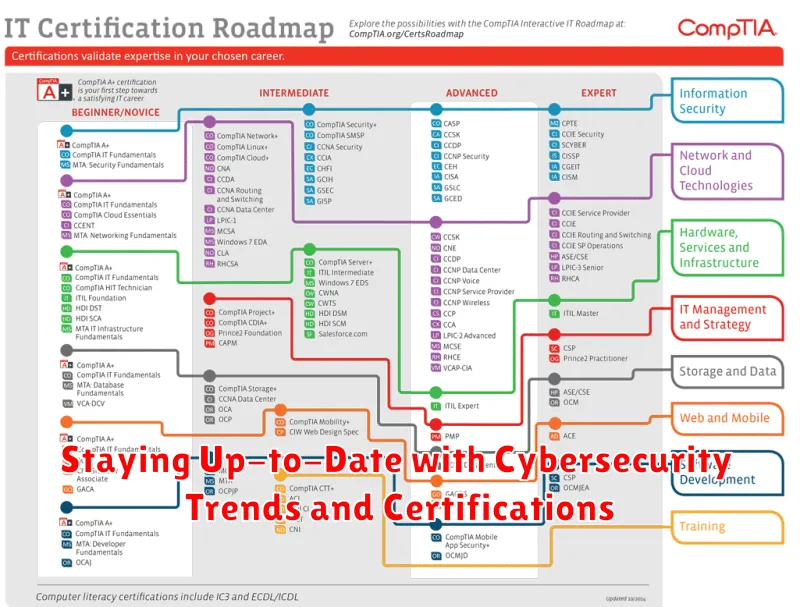
The cybersecurity landscape is constantly evolving, with new threats emerging and existing vulnerabilities being exploited. Staying ahead of the curve is crucial for cybersecurity professionals, and obtaining relevant certifications is a key step in this process.
Certifications demonstrate your knowledge and skills to potential employers, and can also help you gain a competitive edge in the job market. Many organizations offer a range of certifications covering different areas of cybersecurity, such as ethical hacking, risk management, and cloud security.
To ensure you’re staying up-to-date with the latest trends and technologies, consider:
- Attending industry conferences and webinars: These events provide valuable insights from experts and allow you to network with other professionals.
- Reading cybersecurity blogs and publications: Staying informed about current threats and best practices is essential.
- Joining online communities and forums: Engaging in discussions and sharing knowledge with others can help you stay abreast of emerging trends.
In addition to staying informed, it’s important to regularly review and update your skills. Consider pursuing certifications that align with your career goals and the needs of your organization.

